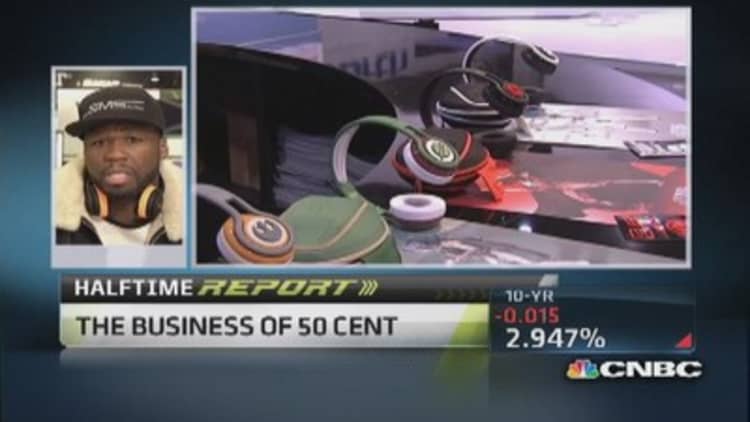Curtis Jackson III wears a lot of hats. He's a musician. He's an actor. He's the owner of G-Unit Clothing, owner and CEO of SMS Audio and founder of SK Energy.
But ask him what he considers to be his job and he doesn't list any of these. Instead, the serial entrepreneur sees himself as the CEO of the 50 Cent brand. In that alternate universe, Jackson, better known by his music nom de plum, says he sees all of his ventures—both past and present—as revolving around his alter ego.
"It's one brand," he said in an interview with CNBC.com. "When it's an artist, it's all connected to that person's lifestyle."
50 Cent has an impressive track record as a businessman. SMS Audio headphones are among the most successful in the category (competing, ironically, against the Beats line founded by his friend Dr. Dre.) In 2010 his film production company, Cheetah Vision, secured $200 million in funding. And his latest venture—a boxing promotion firm called SMS Promotions—has roped in Andre Dirrell, who won the middleweight bronze medal at the 2004 Summer Olympics, and junior middleweight James Kirkland.
(Read more: How solo businesses can make a million)
In some ways, the 50 Cent brand is not unlike many of today's start-ups. While it's diversified, it all revolves around one central theme: The music tells the story, and the businesses support that story.
The lyrics in his business playbook are a bit different than those in his songs, though. Here are strategies he's used to "Get Rich or Die Tryin'.''
Lesson No. 1: The power of partnerships
I envision SMS being to the audio space what Lucasfilm is to the film technology business.50 Centrapper and business mogul
SMS draws a lot of strength from the street cred of 50 Cent, but in the past year, it has begun to use other big names, including music producer Timbaland and Knicks point guard Carmelo Anthony, to draw in customers.
This year the company is adding a somewhat unexpected third license to the brand: a line of Star Wars–themed headsets.
"I'm gonna go away from the trends of things," Jackson said. "The Star Wars collaboration was a surprise for people, but I envision SMS being to the audio space what Lucasfilm is to the film technology business."
(Read more: Trading 'Gut' for Best Practice in Business Expansion)
The strength of deals like the one with Anthony or the one with Disney for Star Wars is that it exposes SMS to an audience that normally might not consider it, which could in turn make consumers more aware of Jackson's other business ventures. That keeps the brand growing and the money flowing.
Lesson No. 2: Defy brand expectations

When 50 Cent began working with corporations after hitting it big in the music industry, he said, other rap artists were aghast.
"With the music culture, you were a sellout to be a part of doing business with a major corporation," he said. "You were considered a crossover from hard-core hip-hop. Now technology has changed how people consume music. Because music companies aren't making as much as they were from CD sales, they're not providing the marketing dollars. Now you see the biggest artists in a car commercial with their new song."
He confounded people—from fans to his manager—with his investment in the product known today as vitaminwater. In 2007, though, that company was purchased by Coca-Cola for $4.1 billion. His share of the deal was estimated at $100 million.
"My manager, when I told him I wanted to sell water … was like, 'Water? Where?'" said Jackson. "If I'd have said I want to sell vodka, he would have got it, but I wanted water. [Water] is the top-selling beverage, and it's consumed where music is played."
The experience taught him that letting others—even advisors or a board—dictate what your company or band is can restrict growth. Producing more of the same or taking a similar path to your peers may be the safe route, but it's something that can prevent explosive growth.
Had he let his managers talk him out of the vitaminwater deal, it's possible that the 50 Cent brand would be restricted to the music world today. Instead, the money earned from that venture let him continue to grow his business ventures.
(Read more: The little company that conquered conglomerates)
Predictability, he said, can be devastating to a company, as can complacency. That, in part, is why he generally avoids the rock-star lifestyle. With his numerous ventures, sleeping in often isn't an option.
"People who work for themselves work a lot harder," he said. "For me, I don't care what hour it is. If I can't sleep, I work. I wake up at between 5:30 and 6:00 a.m., because I know I have a project or have to get something done."
Lesson No. 3: Cling to the entrepreneurial lifestyle
As businesses grow, the lean, hungry attitude that drives most entrepreneurs often begins to fade. Jackson, though, said it's important to resist those changes. One good way to do that is to always be on the lookout for new ways to learn.
Selling crack on the streets of Queens, for example, may not seem a good foundation for a business leader, but Jackson says there were lessons he learned from the mistakes of his youth that are still helpful today.
"In the neighborhood, you have to troubleshoot," he said. "If you see an issue [developing], you have to resolve it. It's the same circumstances in business: If you see, say, something going on with your employees, you have to take care of it."
While Jackson didn't have a mentor in the traditional sense of the word, he said he did draw inspiration from Robert Green's book The 48 Laws of Power. The book, which is extremely popular with groups from hip-hop artists to criminals, discusses often-ruthless business techniques for those who want power or who simply want to arm themselves against it (tips include mastering the art of timing and keeping people in suspense).
The book, in short, taught him to not be afraid. And Jackson made a point to seek out the author after reading it.
"I had to meet him after I read the book," he said. "There were so many things that ran parallel to the environment, and a lot of people gravitated to it from the hip-hop culture. I wanted to see if he knew what he created. It turns out he's a real history buff. He has a passion for it. And I think that's what makes the difference: passion."
—By Chris Morris, Special to CNBC.com.




